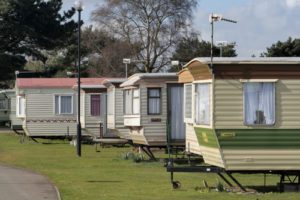Living in a mobile home can be advantageous in some regards, but it can be especially challenging in others. One of the issues that many mobile homeowners face is a lack of space, which can make it difficult to install and utilize larger appliances. Take heating and air conditioning, for example. Many homeowners across the United States rely on HVAC systems to stay comfortable when the weather outside is excessively hot or cold, but mobile home owners often wonder if central heat and air units for mobile homes even exist. Fortunately, there are such things as central heating and cooling units for mobile homes.
 Of course, central heat and air units for mobile homes are not the only options. There are also window mounted units, wall-mounted mini-splits, and packaged systems that attach to the exterior of your building. The question shouldn’t be whether central heating and air exists for mobile home owners. The question is: just how viable is it? Should you install an HVAC in your mobile home, or would you have better luck with another kind of system?
Of course, central heat and air units for mobile homes are not the only options. There are also window mounted units, wall-mounted mini-splits, and packaged systems that attach to the exterior of your building. The question shouldn’t be whether central heating and air exists for mobile home owners. The question is: just how viable is it? Should you install an HVAC in your mobile home, or would you have better luck with another kind of system?
The answer isn’t straightforward. The fact is that different systems may be more or less effective for you depending on your circumstances. To gain a clearer picture, it is worth comparing the pros and cons of different mobile home heating and air systems side by side. Doing so can help you determine whether central heat -and air is a sound investment.
- Window Air Conditioners
We’ll cover window air conditioners first so that we can put them behind us quickly. The fact is that window air conditioners are limited in their ability to cool an entire house efficiently. They are relatively energy efficient for single rooms, but installing one in each room of your mobile home would prove to be costly. Then there’s the obvious: window air conditioners don’t produce heat. You can find window-mounted heat pumps that can switch between heating and cooling modes, but these are even more expensive and not as common. Window mounted units can be good ideas for particularly small mobile homes or those with few rooms, but in other cases, they are less ideal.
- Packaged Systems
Another option for mobile homeowners is to purchase a packaged system. Packaged systems combine a heater and an air conditioner in a single unit, which typically takes the form of a rooftop- or wall-mounted box. The main advantage of packaged systems for mobile homeowners is that they do not take up space inside the home. However, you’ll have to trade some of your home’s appeal for that convenience. Many people find that packaged systems make their rooftops look ugly. Since the entire system is outside, it may also be prone to costly damage from inclement weather, wildlife, or other hazards.
- Wall-Mounted Mini Split Systems
Wall-mounted mini split systems are quite popular with some mobile home owners, and it’s not hard to see why. These small units are unobtrusive and unlikely to have a severe impact on either your interior design or your amount of available space. They suffer from some of the same issues as window air conditioners and heat pumps—namely, the fact that they work better in single rooms than for entire homes. It’s also worth considering the costs of purchasing multiple units. Each one alone is rather inexpensive, but a minimum of three are usually required for each room that you intend to heat or cool sufficiently.
- Central Heat and Air Units for Mobile Homes
Central heat and air units may not be ideal for every mobile home. You will need enough closet space to store your indoor unit, and your mobile home may require ductwork. However, if you have an appropriate storage space and the infrastructure for a ducted system, an HVAC is almost always going to be more cost-effective and convenient than the other methods listed. There are also more quality brands available, which means a wider range of consumer choice. Just make sure that you have your system installed by an experienced professional who is licensed to perform their work. In California, a C-20 license is required for all HVAC services that exceed $500. Investing in a qualified technician will help you avoid long term costs due to negligence or error on the part of an inexperienced contractor.
There are many options for mobile home owners who want to remain comfortable all year round. You don’t have to buy central heat and air units for mobile homes. However, investing in an HVAC is often the smartest long-term investment, especially when you have a professional at your side for careful installation and regular service. Contact the professionals when you want to learn more about the different options available to you and speak with a professional who can help you learn more about each choice. With their help, you’ll be able to make a confident decision about the climate control you use in your mobile home.
Check with us here at Valley Comfort Heating and Air, our customers love our attention to detail and our friendly, affordable service. (707) 539-4533
